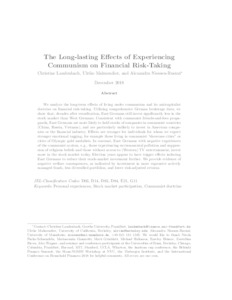|
The long-lasting effects of experiencing communism on financial risk-taking
Laudenbach, Christine
;
Malmendier, Ulrike
;
Niessen-Ruenzi, Alexandra
Dies ist die aktuellste Version dieses Eintrags.
![[img]](https://madoc.bib.uni-mannheim.de/47668/1.hassmallThumbnailVersion/TheLonglastingEffectsOfExperiencin_preview.pdf)  Vorschau |
|
PDF
TheLonglastingEffectsOfExperiencin_preview.pdf
- Veröffentlichte Version
Download (3MB)
|
|
URL:
|
https://ub-madoc.bib.uni-mannheim.de/47668
|
|
URN:
|
urn:nbn:de:bsz:180-madoc-476689
|
|
Dokumenttyp:
|
Arbeitspapier
|
|
Erscheinungsjahr:
|
2018
|
|
Ort der Veröffentlichung:
|
Mannheim [u.a.]
|
|
Auflage:
|
Version Dez. 2018
|
|
Sprache der Veröffentlichung:
|
Englisch
|
|
Einrichtung:
|
Fakultät für Betriebswirtschaftslehre > ABWL u. Corporate Governance (Niessen-Ruenzi 2012-)
|
|
Fachgebiet:
|
650 Management
|
|
Fachklassifikation:
|
JEL:
D03 , D14 , D83 , D84 , E21 , G11,
|
|
Freie Schlagwörter (Englisch):
|
Personal experiences , Stock market participation , Communist doctrine
|
|
Abstract:
|
We analyze the long-term effects of living under communism and its political propaganda in East Germany (former GDR) for financial risk-taking. Utilizing comprehensive German brokerage data, we show that, decades after reunification, East Germans still invest significantly less in the stock market. Consistent with communist friends-and-foes propaganda, they are more likely to hold stocks of companies in communist countries (China, Russia, Vietnam), and are particularly unlikely to invest in American companies or the financial industry. Effects are stronger for individuals for whom we expect stronger emotional priming, for example those living in communist “showcase cities” or cities of Olympic gold medalists. In contrast, East Germans with negative experiences
invest more in the stock market today, e. g., those experiencing environmental pollution and suppression of religious beliefs and those without access to (Western) TV entertainment. Election years appear to have trigger effects inducing East Germans to reduce their stock-market investment further. We also provide evidence of negative welfare consequences, as indicated by investment in more expensive actively managed funds, less diversified portfolios, and lower risk-adjusted returns.
|
 | Dieser Eintrag ist Teil der Universitätsbibliographie. |
 | Das Dokument wird vom Publikationsserver der Universitätsbibliothek Mannheim bereitgestellt. |
Verfügbare Versionen dieses Eintrags
 Suche Autoren in Suche Autoren in
BASE:
Laudenbach, Christine
;
Malmendier, Ulrike
;
Niessen-Ruenzi, Alexandra
Google Scholar:
Laudenbach, Christine
;
Malmendier, Ulrike
;
Niessen-Ruenzi, Alexandra
ORCID:
Laudenbach, Christine, Malmendier, Ulrike and Niessen-Ruenzi, Alexandra  ORCID: https://orcid.org/0000-0002-9493-8280 ORCID: https://orcid.org/0000-0002-9493-8280
Sie haben einen Fehler gefunden? Teilen Sie uns Ihren Korrekturwunsch bitte hier mit: E-Mail
Actions (login required)
 |
Eintrag anzeigen |
|
|
 ORCID: https://orcid.org/0000-0002-9493-8280
ORCID: https://orcid.org/0000-0002-9493-8280



 Suche Autoren in
Suche Autoren in